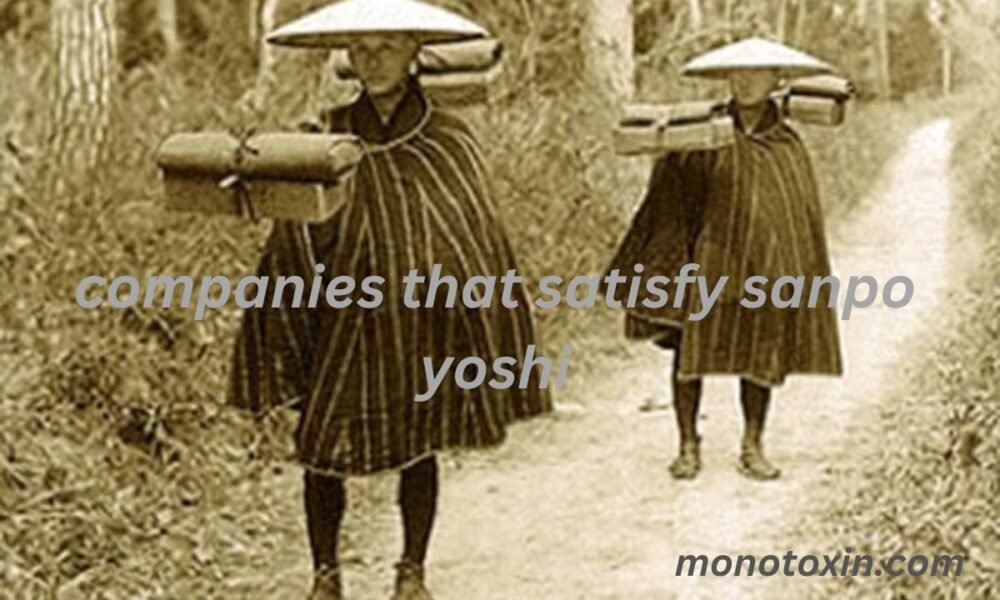Introduction
Environmental, Social, and Governance (ESG) investing has gained immense traction as more investors seek to support sustainable and ethical businesses. However, Japan’s corporate landscape often faces skepticism due to past scandals that have tainted its reputation in this arena. companies that satisfy sanpo yoshi an ancient Japanese business principle that promotes win-win-win outcomes for the seller, buyer, and society. This 400-year-old practice offers a refreshing perspective on sustainability, aligning closely with modern ESG principles. In this blog, we’ll explore the origins of Sanpo Yoshi, its relevance to contemporary ESG practices, and highlight companies that embody these values.
The Origins of Sanpo Yoshi
Sanpo Yoshi, translating to “good for the seller, buyer, and society,” is a business ethos that dates back to early modern Japan. It was first practiced by the Omi Shonin, a group of traveling merchants known for their integrity and commitment to mutual benefit. These merchants built their businesses on trust and long-term relationships, principles that were deeply influenced by Confucian ethics. By prioritizing the well-being of all parties involved, the Omi Shonin created a sustainable business model that stood the test of time.
The Omi Shonin understood that their success depended on the satisfaction of their customers and the community. This holistic approach to business not only fostered customer loyalty but also promoted social harmony. In a time where commerce was often seen as a zero-sum game, Sanpo Yoshi offered a revolutionary alternative that emphasized mutual benefit and ethical conduct.
Sanpo Yoshi and Modern ESG Practices
In today’s corporate world, companies that satisfy sanpo yoshi resonates strongly with the principles of ESG investing. Modern ESG practices encourage companies to look beyond shareholder profit and consider their impact on society and the environment. Sanpo Yoshi embodies this spirit, advocating for a balance between economic growth, social responsibility, and environmental stewardship.
One striking example is the contrast in CEO compensation between Japan and the United States. Japanese CEOs typically earn significantly less than their American counterparts, reflecting a cultural emphasis on collective success over personal gain. This mindset aligns closely with ESG principles, which prioritize long-term value creation over short-term financial gains.
Unique Initiatives Inspired by Sanpo Yoshi
Lasertec’s Customer-Centric Approach
Lasertec, a company specializing in inspection tools, exemplifies the Sanpo Yoshi philosophy by prioritizing customer satisfaction over immediate revenue. Their business model focuses on developing high-quality products that meet the specific needs of their clients, fostering long-term relationships built on trust and reliability. By putting their customers first, Lasertec ensures that their innovations provide real value, creating a win-win scenario for both parties.
Sysmex’s Socially-Driven Mission
Sysmex, a global leader in blood testing technologies, integrates social responsibility into its core business strategy. The company’s mission goes beyond profit; it aims to address critical healthcare needs worldwide. Through continuous innovation and a commitment to quality, Sysmex has made significant strides in improving diagnostic accuracy and accessibility. This dedication to societal well-being is a modern manifestation of the Sanpo Yoshi principle.
Daikin’s Environmental Innovations
Daikin Industries, a prominent manufacturer of air conditioning systems, takes proactive steps to protect the environment through innovative solutions. Their commitment to sustainability is evident in their research and development efforts, which focus on creating energy-efficient and eco-friendly products. Daikin’s approach demonstrates how businesses can achieve economic success while contributing positively to environmental conservation, embodying the essence of Sanpo Yoshi.
YOU MAY ALSO LIKE;
Elevate Your Business with Pikruos: The Ultimate Freelance Business Assistant Solution
Conclusion
Sanpo Yoshi is more than just an ancient business principle; it’s a timeless philosophy that aligns perfectly with modern ESG practices. By prioritizing the well-being of all stakeholders—sellers, buyers, and society—companies can achieve sustainable success and make a positive impact on the world. The examples of Lasertec, Sysmex, and Daikin illustrate how Sanpo Yoshi continues to inspire ethical and responsible business practices today.
Frequently Asked Questions (FAQs)
- What is Sanpo Yoshi?
Sanpo Yoshi is a Japanese business principle that promotes win-win-win outcomes for sellers, buyers, and society, ensuring mutual benefit.
- How does Sanpo Yoshi relate to ESG investing?
Sanpo Yoshi aligns with ESG principles by emphasizing ethical conduct, social responsibility, and environmental stewardship in business practices.
- Which companies are inspired by Sanpo Yoshi principles?
Companies like Lasertec, Sysmex, and Daikin Industries embody Sanpo Yoshi through their customer-centric, socially-driven, and environmentally innovative practices.
- Why is CEO compensation lower in Japan compared to the US?
Japanese CEOs typically earn less due to a cultural emphasis on collective success over personal gain, a mindset that aligns with Sanpo Yoshi and ESG principles.
- What impact has Sanpo Yoshi had on modern businesses?
Sanpo Yoshi has inspired businesses to prioritize long-term value creation, customer satisfaction, and social and environmental well-being, promoting sustainable success.











